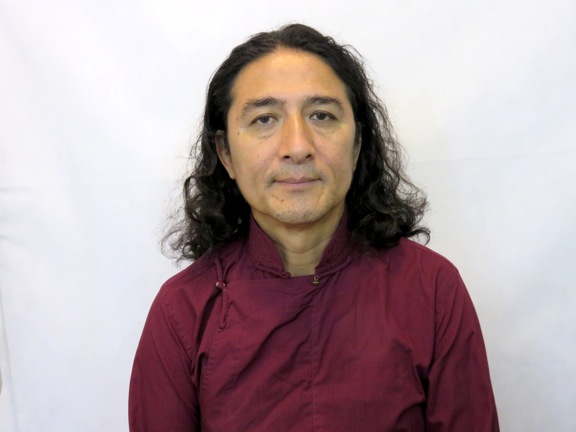ARTIST PROFILE: Keeping Tibetan culture alive in Lake Placid

Tashi D. Sharzur, aka Techung (Photo provided — Steve Lester)
LAKE PLACID-The Chinese communists since 1951 have been committing “cultural genocide” in Tibet in an effort to forcefully prevent the Tibetan people from practicing their ancient traditions in religious worship and artistic expression in an area that covers roughly one fourth of the Chinese mainland, according to critics.
Violent deaths over the decades have run into the millions between armed uprisings and barbaric behavior on the part of communist authorities causing hundreds of thousands to flee and settle mostly in India, determined to preserve their cultural heritage. Among those who have settled in the west include Tashi D. Sharzur, a musician who lives in Lake Placid and goes by the name “Techung.”
Born in a neutral buffer zone between Tibet and India in the early 1960s a few years before Mao Zedong’s bloody “Cultural Revolution,” Techung’s family fled to the Indian state of Sikkim in the northeast where his mother enrolled him at age 6 into a school for the performing arts, where he received instruction in music and dance in an effort to preserve his family’s Tibetan culture.
“I was never from a musical family or anything like that,” he said.
Techung’s stepfather worked as a caretaker for a high ranking lama, he said, both of whom hid on a mountain during the Cultural Revolution thinking it would blow over in about a year. But two years later, the communists were still destroying the temples and anything that was old and relating to religious faith in an effort to get Tibetans to stop looking to their past but to look to the future as envisioned by Chairman Mao.
“That is the reason my parents went into exile,” Techung said.
Techung moved to San Francisco around 1987 where he co-founded the Chaksampa Tibetan Dance & Opera Company, which performed at various music festivals and at Carnegie Hall.
To succeed with this group, he had to learn how to self-manage all the logistics of being a performer, unlike in India where that was all handled by the Tibet Institute of Performing Arts.
“All I had to do over there was be a performer,” he said. “Then I came here and had to learn how to do that all that managing stuff on my own.”
A few years later, while working out of Atlanta, Techung booked some gigs in Plattsburgh where a distant relative owns Himalaya Restaurant. That connection along with a friend who owns the women’s clothing store Vision of Tibet on Main Street in the Alpine Mall prompted him to move to Lake Placid about four years ago.
“Being an artist, I wanted to get away from the big cities where it’s always so expensive,” he said. “Basically I love the nature here, the fall, the winter, and I love the community too.”
Although Techung’s stepfather has since passed, he still maintains close contact with his mother, who once came to Lake Placid for a visit.
“She was here in the winter,” he said, “which was a little too much.”
Two years ago, Techung got married here to Sisa Selgado, a South American native trained in Asian classical dance. They met in India.
Techung’s own musical pursuits have produced seven solo albums along with appearances on at least a dozen more including one that features “the Dalai Lama’s own words and narration by Harrison Ford,” according to his website, www.techung.com.
For his 2012 recording, “Techung, Songs from Tibet,” critic Derek Beres wrote “… Much like the Dalai Lama (who Techung has performed with), you feel a sense of inherent compassion within this record’s 55 minutes …” “… Hence you have these eight beautiful and tender songs, minimally sung alongside the plucked lute (damnyen), and spiked fiddle (Piwang).”
In the mid-1990s, Techung joined a list of marquis pop acts that included the Beastie Boys and Red Hot Chili Peppers to perform at the Tibet House Annual Benefit Concert at Carnegie Hall. At the personal invitation of Phillip Glass, he continues to perform at this annual event as he did last March along with Patti Smith and Carly Simon.
This year, Techung received a coveted fellowship grant from New York State’s Council For the Arts and the New York Foundation for the Arts in Folk and Traditional Arts. The grant, he said, has no stipulations except that he continue to “preserve and promote Tibetan culture.”
“I have a responsibility to let people know there are good things about Tibet,” he said, “but sad things, too.”



